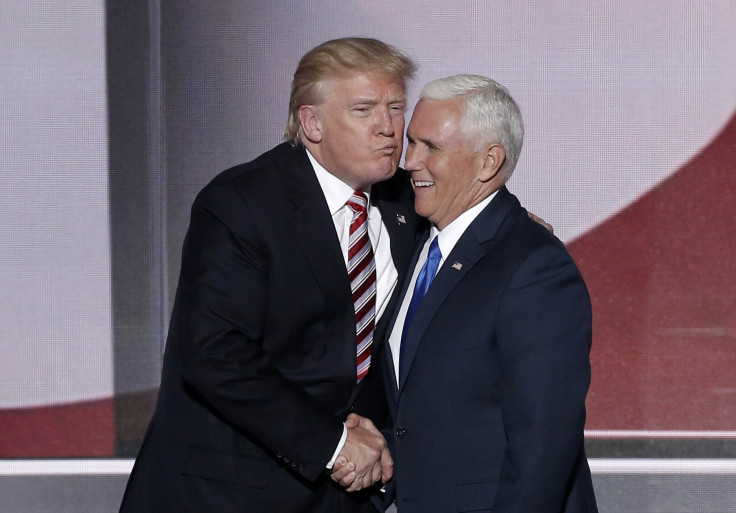Mike Pence On Abortion, Gay Rights: Vice President-Elect's Controversial Views, Policies On Women And LGBT Community

As president-elect Donald Trump begins his transition into the White House, a great deal of attention has centered on the complex decisions surrounding the transfer of power. Vice-president elect Mike Pence, a staunch conservative who has implemented or tried to implement controversial policy decisions during his time as Indiana's governor, replaced Gov. Chris Christie of New Jersey as the leader of the transition team, strengthening speculation he will have a more prominent role in the administration than once thought.
Pence's political rise has been unconventional and mostly under the radar on the national scene. He started his political career in 1988 after twice failing to defeat former U.S. House Representative Phil Sharp. While serving as president of the Indiana Policy Review, a Fort Wayne-based conservative think tank, Pence would begin hosting a statewide syndicated radio show in the early 1990s. He would later be elected to the House from 2001 to 2013 in Indiana's second district, which includes working-class cities like Elkhart. In 2012, he narrowly defeated Democrat John Gregg to succeed highly popular governor Mitch Daniels.
Throughout his time in public office, Pence's conservative credentials have remained clear. As governor, Pence received a 99 percent rating from the American Conservative Union and had just a 7 percent rating by American Civil Liberties Union as a congressman. In his own words, Pence described himself in 2010 as “a Christian, a conservative and a Republican in that order.”
With one Supreme Court appointment certain, many liberals and conservatives will be interested in knowing what type of influence Pence will wield within the administration on social issues. His anti-abortion stance and history of anti-LGBT policies have many worried that the Trump adminstration will restrict the rights of both women and the LGBT community.
Pence's religious beliefs account for the fierce opposition to abortion that has guided much of his legislation. His quest to defund Planned Parenthood was pushed into high gear as a congressman in 2011 when he submitted an amendment to the House to significantly cut funding for the organization.
“If Planned Parenthood wants to be involved in providing counseling services and HIV testing, they ought not to be in the business of providing abortions,” Pence told Politico in a 2011 interview. “As long as they aspire to do that, I’ll be after them.”
Pence would keep his word. By 2014, just a year after he became governor, Indiana had slashed its funding to Planned Parenthood to half of its 2005 levels. Pence also signed a measure in March 2016 prohibiting abortions performed on the basis of a fetus’ race, disability or gender. The law allowed doctors who were found to have performed abortions on the basis of any of those characteristics to be held liable for wrongful death.
“By enacting this legislation, we take an important step in protecting the unborn while still providing an exception for the life of the mother,” Pence said in a statement. “I sign this legislation with a prayer that God would continue to bless these precious children, mothers and families.” The law was ultimately struck down by a federal judge.
Pence also has a contentious history with the LGBT community. He opposed the repeal of “Don’t Ask, Don’t Tell,” a controversial law enacted in 1993 by Bill Clinton intended to keep the sexual orientation of military service members confidential.
“We ought not to use the American military as a backdrop for social experimentation or debating domestic policy issues,” he told CNN in 2010.
In 2015, Pence signed Indiana’s Religious Freedom Act into law, allowing business owners to deny service to any person if they felt that serving them would violate their religious beliefs. He later amended the law to say that business owners could not discriminate on the basis of sexual orientation, race, religion or disability, angering those who felt that it made the law insufficient, and disappointing those who still felt it would allow for discrimination.
Accusations have been leveled at Pence for supporting conversion, or electroshock, therapy as a means of changing a person’s sexual orientation, though he has never explicitly said that. The allegations likely come from Pence’s statements when he was running for Congress in 2000. During that time, his campaign website stated that Congress should only support a law providing funding for HIV/AIDS treatment “after completion of an audit to ensure that federal dollars were no longer being given to organizations that celebrate and encourage the types of behaviors that facilitate the spreading of the HIV virus. Resources should be directed toward those institutions which provide assistance to those seeking to change their sexual behavior.”
Trump told "60 Minutes" on Sunday that he wouldn’t seek to ban gay marriage as president. “It’s law,” he said. “It was settled in the Supreme Court. I mean, it’s done.”
Despite the fact that Roe v. Wade is also the law of the land, Trump implied he wouldn’t rule out changing it. “If it ever were overturned, it would go back to the states.”
© Copyright IBTimes 2024. All rights reserved.






















